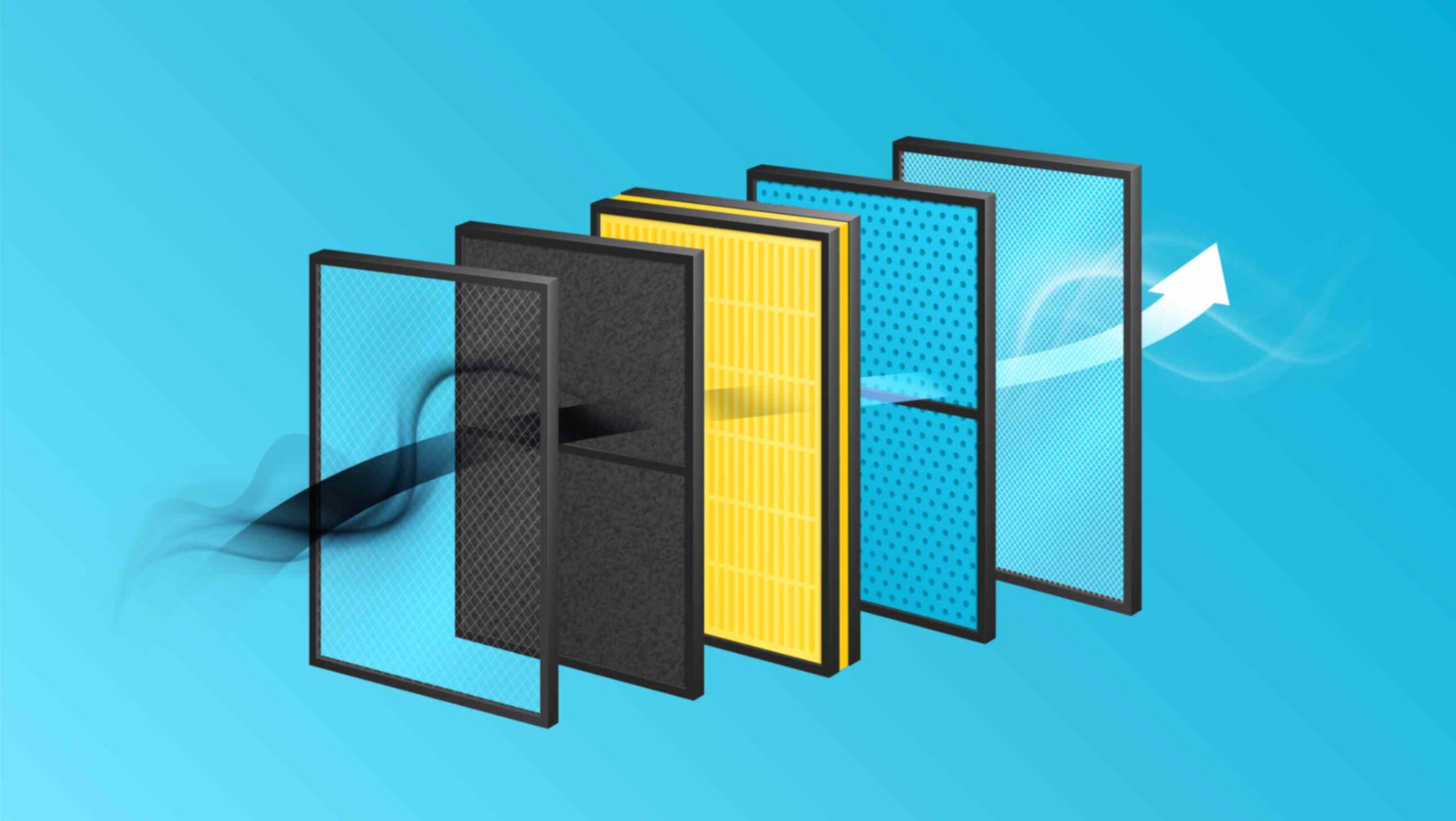
High-Efficiency Particulate Air (HEPA) filters are advanced systems for cleaning the air. They catch tiny airborne contaminants, improving indoor air quality. And these filters can trap at least 99.97% of particles that are 0.3 microns in size.
This makes HEPA filters key in places needing clean air, like hospitals and homes with air purifiers. They help remove dust, pollen, and allergens from the air. This reduces worries about air purifiers causing sinus problems.
Key Takeaways
- For this HEPA filters capture 99.97% of airborne particles as small as 0.3 microns.
- They are crucial in environments requiring high air quality, such as hospitals and labs.
- Effective in air purifiers to prevent sinus problems by removing allergens.
- Commonly used in homes alongside air purifiers and vacuum cleaners.
- Play a significant role in preventing respiratory issues by improving indoor air quality.
Introduction to HEPA Filters
HEPA filters are key to keeping indoor air clean and safe. But what is a HEPA filter and why is it so important for air purification? Let’s explore the basics and why they’re vital.
Definition and Purpose
A HEPA (High Efficiency Particulate Air) filter catches at least 99.97% of particles as small as 0.3 microns. Its main job is to trap fine particles like dust, pollen, mold, bacteria, and more. This makes HEPA filters crucial in places that need very clean air.
Importance in Air Purification
Using a HEPA filter air purifier in homes, offices, and hospitals is vital. The ASHRAE guidelines say HEPA filters are the top choice for clean air. The National Air Filtration Association also notes they’re key in catching tiny particles that others miss.
Knowing what is a HEPA filter shows its big role in improving air quality and health. They help reduce allergy symptoms and keep air clean in hospitals. And HEPA filters are essential for clean air.
Understanding What is a HEPA Filter?
High-Efficiency Particulate Air (HEPA) filters are known for catching at least 99.97% of tiny particles, as small as 0.3 microns. They play a key role in improving indoor air quality. They trap dust, pollen, mold, and even bacteria.
The EPA and ASTM standards highlight HEPA filters’ importance. They are essential for clean and safe air. Knowing about their types and uses helps improve air quality in our homes and workplaces.
How HEPA Filters Work
HEPA filters are known for their top-notch air cleaning. They use mechanical filtration and electrostatic attraction to work. And his makes them key in many areas.
Mechanical Filtration
The mechanical filtration process is vital for HEPA filters. The filter’s media, made of tightly packed fibers, catches particles in three ways. Particles can stick to the fibers, collide with them, or get caught through diffusion.
This method is key to the hepa filter’s success. And it can remove particles as small as 0.3 microns.
Electrostatic Attraction
HEPA filters also use electrostatic attraction to clean better. As particles pass through, they get charged. Then, they’re drawn to the oppositely charged fibers.
This combination of forces makes HEPA filters very effective. They can catch even the smallest particles, thanks to their unique working principle.
Commercial and Industrial HEPA Filters
Commercial and industrial HEPA filters are made to meet strict standards. They are very efficient in cleaning the air in different industries. These filters are used in places like factories, labs, and hospitals, where clean air is crucial.
HEPA Filter Micron Size Explained
HEPA filters work by catching different sizes of particles. They are rated by their micron size, showing how well they filter the air. A micron is one-millionth of a meter, used to measure air particles.
These filters can catch particles as small as 0.3 microns very well. This is key because 0.3-micron particles are hard to filter. They are rated at 99.97% efficient for these tiny particles, showing their top-notch performance.
Standards from groups like ASTM International are important. They make sure filters are tested the same way, giving us reliable info. Leading air filter makers also share how different micron sizes affect how well filters work.
Here’s how HEPA filter micron sizes affect their efficiency:
| Micron Size | Particle Type | HEPA Filter Efficiency |
| And for 0.3 microns | Bacteria, smoke | 99.97% |
| 1 micron | Pollen, mold spores | 99.99% |
| 10 microns | For dust, pet dander | 99.999% |
Knowing about micron ratings helps pick the right HEPA filter. The right filter can catch even the smallest particles. And this makes the air inside cleaner and healthier.
HEPA Filter Working Principle
The hepa filter function works by catching particles in a complex way. It can trap particles as small as 0.3 microns. This is thanks to a mix of diffusion, interception, and inertial impaction.
When air goes through the HEPA filter, big particles get caught right away. Smaller particles, however, move in a zigzag pattern. This makes them more likely to hit the filter fibers. This setup makes the filter very good at cleaning the air.
Studies on fluid dynamics show how important fiber size and air speed are. Thinner fibers and slower air help the hepa filter function more. This is because it reduces particles going back into the air.
The filter’s pleated design also helps a lot. It increases the surface area, trapping more particles without slowing down the air. A good HEPA filter catches lots of particles but doesn’t slow down the air too much. This shows its advanced design.
The Indoor Air Quality Association says HEPA filters are key in cleaning indoor air. They are used everywhere, from homes to hospitals. The filter works best when its design and the air flow are just right. And this makes the air healthier and cleaner.
Key Benefits of Using HEPA Filters
HEPA filters are key to clean air in many places. They catch tiny particles very well. This makes them great for health and the environment.
Health Advantages
Many studies show HEPA filters work well against airborne pollutants. They trap dust mites, pet dander, pollen, and allergens. This includes mold spores, which can cause allergies and asthma.
By cutting down on these pollutants, HEPA filters make the air healthier. This lowers the chance of breathing and heart problems linked to bad air.
HEPA filters also catch bacteria and viruses. This is very important in places like hospitals and labs. It helps keep people safe and supports efforts to fight diseases.
Environmental Impact
HEPA filters are good for the planet too. Unlike some air cleaners, they don’t use chemicals that can harm the air. They work by physically removing pollutants, keeping the air clean.
And they also last longer, which means they need to be replaced less often. Basically it reduces waste and helps the environment.
By keeping the air clean inside, HEPA filters help reduce pollution outside. They are used in big places like factories and offices. So it helps make the air cleaner and healthier for everyone.
Do HEPA Filters Actually Make a Difference?
When we ask, do HEPA filters actually make a difference, we must look at science and real stories. Studies show that HEPA filters greatly improve air quality. They catch particles as small as 0.3 microns, like dust, pollen, and some viruses.
Studies show that places with HEPA filters have cleaner air than those without. This cleaner air means better breathing and fewer allergy and asthma problems for people inside.
Places like hospitals and offices also see big benefits. Hospitals with HEPA filters have fewer infections. Offices and buildings see fewer sick days and happier workers. This shows HEPA filters are key for a healthy indoor space.
The impact of HEPA filters is real and backed by science and people’s experiences. So, the answer to do HEPA filters actually make a difference is yes. They are vital for clean air in our homes and workplaces.
| Environment | Air Quality Improvement | Health Benefits |
| Residential Homes | Up to 85% reduction in allergens | It is reduced asthma and allergy symptoms |
| Commercial Buildings | Up to 70% reduction in indoor pollutants | Fewer sick days, improved productivity |
| Hospitals | High reduction in airborne pathogens | Lower infection rates |
HEPA Filter Efficiency
When checking HEPA filter efficiency, it’s key to use proven metrics. Independent groups often give efficiency ratings. These ratings come from tests that show how well a filter catches tiny particles.
Groups like the U.S. Environmental Protection Agency (EPA) set rules for HEPA filters. They say a true HEPA filter must get rid of at least 99.97% of particles. This means you can trust what manufacturers say about their filters.
- Efficiency Rating: Choose filters with high ratings from trusted groups.
- Certification: Make sure the filter meets EPA standards.
- Performance in Various Conditions: See how the filter does in different situations.
- Maintenance Requirements: Know what upkeep is needed to keep it working well.
These points help make sure your HEPA filter cleans the air well. The work of regulatory bodies and independent groups helps us know how good a filter is. This helps you choose the best one for your needs.
Conclusion
We’ve looked into the world of HEPA filters, from their start to their use today. They are great at catching tiny particles in the air. HEPA filters are key in keeping the air clean. This shows how important they are for health and safety.
FAQ
How do HEPA filters work to remove airborne particles?
HEPA filters use mechanical and electrostatic forces to trap particles. They have a dense mat of fibers that catches particles as air flows through. This way, they remove both big and small particles from the air.
Do HEPA filters actually make a difference in air quality?
Yes, HEPA filters greatly improve air quality. They catch many airborne particles and contaminants. Studies and users agree they reduce allergens and make the air cleaner.
How do HEPA filters work in AC units?
In AC units, HEPA filters work like air purifiers. They trap particles as air moves through. This keeps the air clean by removing contaminants.
What is the micron size of particles HEPA filters can capture?
HEPA filters catch 99.97% of 0.3 micron particles. They also capture smaller particles, making them very good at cleaning the air.
Question is can HEPA filters remove mold from the air?
The answer is yes, HEPA filters can remove mold spores from the air. This stops mold from spreading indoors, helping prevent allergies and breathing problems.
What are the maintenance requirements for HEPA filters?
HEPA filters need to be replaced regularly to work well. How often depends on use, but usually every 3 to 6 months. Keeping them up ensures they clean the air effectively.


